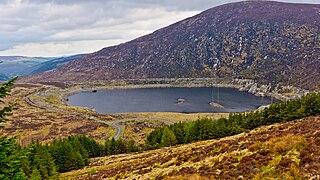James Clement Dooge was an Irish Fine Gael politician, engineer, climatologist, hydrologist and academic who served as Minister for Foreign Affairs from 1981 to 1982, Leader of the Seanad and Leader of Fine Gael in the Seanad from 1982 to 1987 and Cathaoirleach of Seanad Éireann from 1973 to 1977. He served as a Senator from 1961 to 1977 and 1981 to 1987.

The Shannon hydroelectric Scheme was a major development by the Irish Free State in the 1920s to harness the power of the River Shannon. Its product, the Ardnacrusha power plant, is a hydroelectric power station which is still producing power today and is located near Ardnacrusha within County Clare approximately 2.4 kilometres (1.5 mi) from the Limerick border. It is Ireland's largest river hydroelectric scheme and is operated on a purpose built headrace connected to the River Shannon. The plant includes fish ladders so that returning fish, such as salmon, can climb the river safely past the power station.

The Electricity Supply Board is a state owned electricity company operating in the Republic of Ireland. While historically a monopoly, the ESB now operates as a commercial semi-state concern in a "liberalised" and competitive market. It is a statutory corporation whose members are appointed by the government of Ireland.

Third-level education in the Republic of Ireland includes all education after second-level, encompassing higher education in universities and colleges and further education on Post Leaving Certificate (PLC) and other courses. The degree-awarding institutions which can grant awards at all academic levels are the University of Dublin, National University of Ireland, University of Limerick, Dublin City University, Technological University Dublin, the Royal College of Surgeons in Ireland, Munster Technological University, Technological University of the Shannon: Midlands Midwest, Atlantic Technological University and South East Technological University, as well as St. Patrick's College, Maynooth. Quality and Qualifications Ireland, a State agency, can grant awards in other institutions directly, or delegate the authority to do so. The King's Inns of Dublin has a limited role in education specialising in the preparation of candidates for the degree of barrister-at-law to practice as barristers. Medical schools in Ireland also have particular regulation. There were seven establishments of higher education within Ireland ranked among the top 500 universities worldwide by the Times Higher Education Supplement in 2023.

Northern Ireland Electricity Networks Limited (NIE Networks) is the electricity asset owner of the transmission and distribution infrastructure in Northern Ireland, established in 1993 when the business was privatised. NIE Networks does not generate or supply electricity. Since 2010 it has been a subsidiary of ESB Group.
Charles Hesterman Merz was a British electrical engineer who pioneered the use of high-voltage three-phase AC power distribution in the United Kingdom, building a system in the North East of England in the early 20th century that became the model for the country's National Grid.
Oldtown is a population centre and townland in the civil parish of Clonmethan in Fingal, Ireland. The R122 road runs through the village linking Naul to St Margaret's and Dublin Airport.
Dr. Thomas A. McLaughlin was an Irish engineer from Drogheda, County Louth, and one of the key people in the Shannon hydroelectric scheme, an early icon of the Irish Free State. He then helped establish the Electricity Supply Board (ESB) which distributed electricity across Ireland and promoted the rural electrification of Ireland.

Edward M. Walsh, is the founding president of the University of Limerick, one of two new universities established by Ireland in 1989. He headed the institution from its inception as the National Institute for Higher Education Limerick, in 1970, when he was appointed as chairman of the planning board, and director, through its transformation to a university in 1989, when he was appointed president, until his retirement in 1998, when he was awarded the title of "Founding President" for life.

The Walsh Cup is an annual hurling competition staged in Ireland by the Leinster Council of the Gaelic Athletic Association (GAA) since 1954. Contested by the top county teams from the provinces of Leinster, Ulster and Connacht, the tournament consists of a round-robin group stage, followed by a knockout stage. Formerly sponsored by Bord na Móna, it was known as the "Bord na Móna Walsh Cup". Prior to 2018, third-level colleges also competed.
Eddie O'Connor is an Irish businessman who is co-founder and chairman of Mainstream Renewable Power, a renewable energy group.
John J. Kelly is a senior Irish academic. A professor of chemical engineering, he was for a period Dean of the Faculty of Engineering at University College Dublin. He was Executive Director of the Ireland Canada University Foundation, Chairman of the Scholarship Board of the O'Reilly Foundation, and President of Independent College Dublin, and is Chairman of the Board of Trustees of the Friends of Bethlehem University in Ireland.
R.V. Shahi is the Chairman of Energy Infratech Private Limited. He previously served as the Secretary to the Government of India in the Ministry of Power and formerly the Chairman and Managing Director of Bombay Suburban Electric Supply Limited.
Lochlann Quinn is an Irish businessman and philanthropist.

Morris Llewellyn Cooke was an American engineer, best known for his work on Scientific Management and Rural Electrification.

The Turlough Hill Power Station is a pumped storage power station in Ireland, owned and operated by the Electricity Supply Board (ESB).

Laurence Joseph Kettle D.Sc. was a key figure in the industrial and scientific advancement of early twentieth-century Ireland, serving as Chief Engineer of the Dublin Corporation, before being elected as President of The Institution of Civil Engineers and becoming the first chairman of the Industrial Research Committee. He was a founding member of the World Power Conference, a fellow of the Institute of Fuel and a founding member of the Irish Volunteers alongside his brother, the poet and politician, Thomas Kettle.
John James Nolan was an Irish physicist who served as President of the Royal Irish Academy from 1949 to 1952.

The Dublin Institute of Technology (DIT) School of Electrical and Electronic Engineering (SEEE) is the largest and one of the longest established Schools of Electrical and Electronic Engineering in Ireland. It is located at the DIT Kevin Street Campus in Dublin City, as part of the College of Engineering & Built Environment (CEBE).









